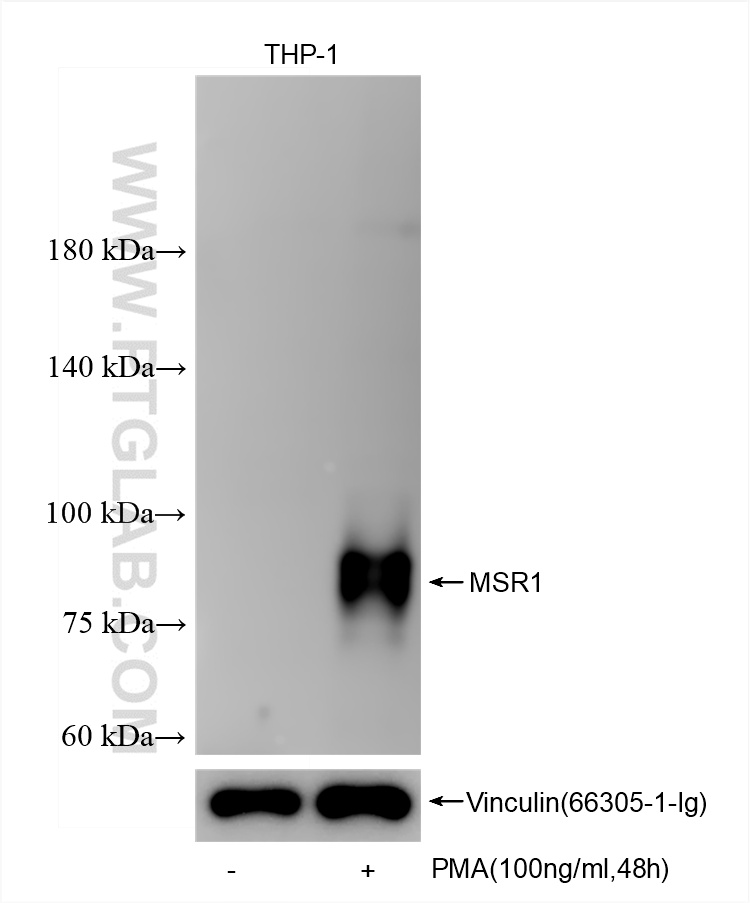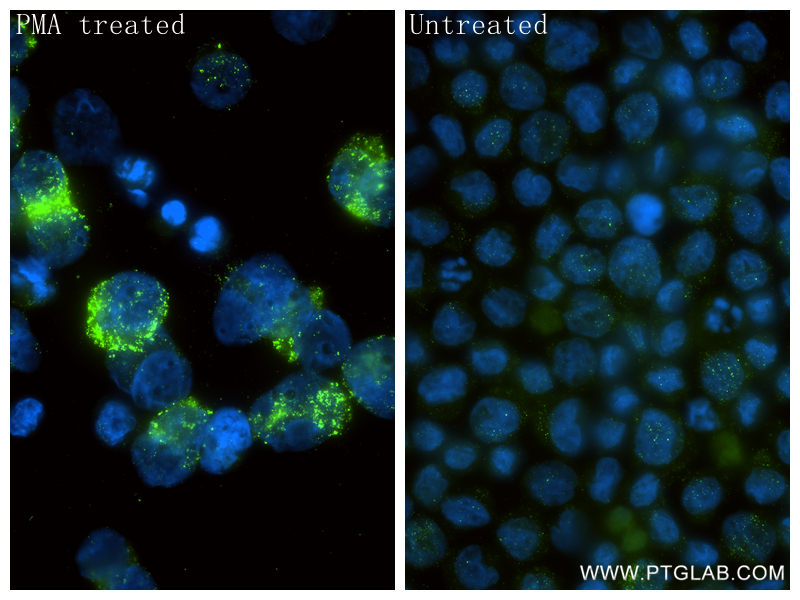验证数据展示
经过测试的应用
| Positive WB detected in | PMA treated THP-1 cells |
| Positive IF/ICC detected in | PMA treated THP-1 cells |
推荐稀释比
| 应用 | 推荐稀释比 |
|---|---|
| Western Blot (WB) | WB : 1:5000-1:50000 |
| Immunofluorescence (IF)/ICC | IF/ICC : 1:500-1:2000 |
| It is recommended that this reagent should be titrated in each testing system to obtain optimal results. | |
| Sample-dependent, Check data in validation data gallery. | |
产品信息
85441-4-RR targets CD204 in WB, IF/ICC, ELISA applications and shows reactivity with human samples.
| 经测试应用 | WB, IF/ICC, ELISA Application Description |
| 经测试反应性 | human |
| 免疫原 |
CatNo: Eg2566 Product name: Recombinant Human CD204 protein (rFc Tag) Source: mammalian cells-derived, pHZ-KIsec-N-rFc Tag: N-rFc Domain: 77-451 aa of BC063878 Sequence: KWETKNCSVSSTNANDITQSLTGKGNDSEEEMRFQEVFMEHMSNMEKRIQHILDMEANLMDTEHFQNFSMTTDQRFNDILLQLSTLFSSVQGHGNAIDEISKSLISLNTTLLDLQLNIENLNGKIQENTFKQQEEISKLEERVYNVSAEIMAMKEEQVHLEQEIKGEVKVLNNITNDLRLKDWEHSQTLRNITLIQGPPGPPGEKGDRGPTGESGPRGFPGPIGPPGLKGDRGAIGFPGSRGLPGYAGRPGNSGPKGQKGEKGSGNTLTPFTKVRLVGGSGPHEGRVEILHSGQWGTICDDRWEVRVGQVVCRSLGYPGVQAVHKAAHFGQGTGPIWLNEVFCFGRESSIEECKIRQWGTRACSHSEDAGVTCTL 种属同源性预测 |
| 宿主/亚型 | Rabbit / IgG |
| 抗体类别 | Recombinant |
| 产品类型 | Antibody |
| 全称 | macrophage scavenger receptor 1 |
| 别名 | Macrophage acetylated LDL receptor I and II, Macrophage scavenger receptor types I and II, MSR1, SCARA1, Scavenger receptor class A member 1 |
| 计算分子量 | 451 aa, 50 kDa |
| 观测分子量 | 90 kDa |
| GenBank蛋白编号 | BC063878 |
| 基因名称 | MSR1 |
| Gene ID (NCBI) | 4481 |
| 偶联类型 | Unconjugated |
| 形式 | Liquid |
| 纯化方式 | Protein A purification |
| UNIPROT ID | P21757 |
| 储存缓冲液 | PBS with 0.02% sodium azide and 50% glycerol, pH 7.3. |
| 储存条件 | Store at -20°C. Stable for one year after shipment. Aliquoting is unnecessary for -20oC storage. |
背景介绍
MSR1, also known as scavenger receptor-A (SR-A) or cluster of differentiation 204 (CD204), was first described in 1979 by Brown and Goldstein. MSR1 is highly expressed in lung, arteries, and adipose tissue.MSR1 is predominantly expressed in various macrophage cell types and is mainly altered in macrophage-associated physiological and pathological processes including atherosclerosis, Alzheimer's disease, host defence, and cancer.
实验方案
| Product Specific Protocols | |
|---|---|
| WB protocol for CD204 antibody 85441-4-RR | Download protocol |
| Standard Protocols | |
|---|---|
| Click here to view our Standard Protocols |



